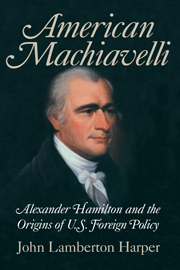Book contents
- Frontmatter
- Contents
- List of Illustrations
- Acknowledgments
- Miscellaneous Frontmatter
- Introduction
- PART I THE COMING OF NECESSITY
- 1 From Providence into Fortune, 1757 (?)–1781
- 2 Prepared To Be Not Good, 1781–1788
- PART II BATTLE LINES ARE DRAWN
- PART III SEIZING THE HELM
- PART IV INFORMAL ADVISER TO THE PRINCE
- PART V A PRINCE IN HIS OWN RIGHT?
- PART VI THE LESSER OF EVILS
- Conclusion: Hamilton Then and Now
- Notes
- Bibliography
- Index
2 - Prepared To Be Not Good, 1781–1788
Published online by Cambridge University Press: 05 April 2013
- Frontmatter
- Contents
- List of Illustrations
- Acknowledgments
- Miscellaneous Frontmatter
- Introduction
- PART I THE COMING OF NECESSITY
- 1 From Providence into Fortune, 1757 (?)–1781
- 2 Prepared To Be Not Good, 1781–1788
- PART II BATTLE LINES ARE DRAWN
- PART III SEIZING THE HELM
- PART IV INFORMAL ADVISER TO THE PRINCE
- PART V A PRINCE IN HIS OWN RIGHT?
- PART VI THE LESSER OF EVILS
- Conclusion: Hamilton Then and Now
- Notes
- Bibliography
- Index
Summary
Back to the Books
At the end of December 1780, Hamilton took leave from Washington’s staff for one of the most important appointments of his life: his marriage to Elizabeth “Eliza” Schuyler in Albany, New York. It was a choice in which romantic attachment went hand in hand with social and political opportunism. One of Hamilton’s fellow officers described the bride, about Hamilton’s age, as “A brunette with the most good-natured, lively dark eyes that I ever saw which threw a beam of good temper and benevolence over her whole countenance.” She was also the second of four daughters of the upstate New York landholder, and future Hamilton supporter, General Philip Schuyler. After Yorktown, Hamilton left the army, ensconced himself in the Schuyler family’s orange brick mansion overlooking the Hudson River at Albany, and prepared for the bar. He was admitted an attorney qualified to practice before the New York Supreme Court the following July and as counsel (equivalent of the English barrister) in October 1782.
Among the authors who left an impression on Hamilton during his legal studies was the leading eighteenth-century authority on the law of nations, the Swiss Emmerich de Vattel. From seventeenth century, post-Machiavellian writers like Thomas Hobbes and John Locke, Vattel had inherited the notion of a “state of nature” (existing before the formation of polities) in which all human beings possessed “natural rights,” that is, to life, liberty, and property. According to Vattel, what was true of individuals in the state of nature was also true of nations: they were endowed with equal rights. “Power or weakness does not in this respect produce any difference. A dwarf is as much a man as a giant; a small kingdom is no less a sovereign state than the most powerful kingdom.” Along with rights came obligations: “Since the universal society of the human race is an institution of nature . . . all men of whatever condition are bound to advance its interests and to fulfil [sic] its duties.” When people formed states those obligations did not end: it devolved upon “the state, and its rulers, to fulfil [sic] the duties of humanity towards strangers . . . and it is the state more particularly that is to perform those duties towards other states.”
- Type
- Chapter
- Information
- American MachiavelliAlexander Hamilton and the Origins of U.S. Foreign Policy, pp. 26 - 40Publisher: Cambridge University PressPrint publication year: 2004



